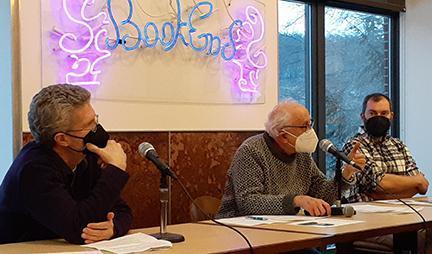Roundtable discussion reviews Ukraine crisis, history and possible future

Three Alfred University professors hosted a roundtable discussion this week with students, faculty and staff members to review the complex history of Ukraine, its relations with Russia and the former Soviet Union, and future prospects for the global order now under a literal bombardment.
Three Alfred University professors hosted a roundtable discussion this week with students, faculty and staff members to review the complex history of Ukraine, its relations with Russia and the former Soviet Union, and future prospects for the global order now under a literal bombardment.
The professors: Andrew Kless, Assistant Professor of History in the Division of Human Studies; Gary Ostrower, retired Professor of History; and Jeff Sluyter-Beltrao, Associate Professor of Political Science, Division of Social Sciences. All three professors teach or have taught in the University’s College of Liberal Arts and Sciences.
Kless presented a compact overview of Ukraine history, citing Ukraine as the “Crossroads of Europe” and noting its complex history orienting and re-orienting itself between European powers to its west and Russia to its east. The history of Ukraine, Kless said, is a history of “push and pull between West and East.”
Sluyter-Beltrao tied his remarks to the emergence of what he termed “a liberal world order” that emerged after World War II, based on liberal political traditions that developed out of the eighteenth century. Following the collapse of the Soviet Union, he said, that order distilled itself into three principal elements: The assurance of U.S. global primacy; the expansion of U.S. influence; and the promotion of liberal policies dating back to Adam Smith and John Locke – what Sluyter-Beltrao characterized as the “traditional democratic values.”
Russian president Vladimir Putin, he said, sees a threat to Russia in the West’s promotion of liberal political values. In addition, he argued, the expansion of NATO toward the east after the collapse of the Soviet Union created for Putin at least the perception of a military threat.
Ostrower characterized Putin’s governance of Russia as “a two-decade-old campaign to destroy the global system.” The real issue for Putin, he said, “is to destroy NATO entirely.” He added: “Europe needs NATO.”
A lively question-and-answer period included comments and speculation regarding the shaky future. Ostrower argued Putin’s goal is not just the conquest of Ukraine. “Putin wants to create a Greater Russia.” Sluyter-Beltrau added the stakes are enormous for Putin: If Putin loses Ukraine, “his whole idea of a Russian ‘pole’ of influence collapses.”
Kless said he believes Putin would’ve invaded Ukraine regardless of NATO’s eastward expansion. Putin, he said will be satisfied only with the installation of a Ukrainian leader on the order of an Alexander Lukashenko, the autocratic leader of neighboring Belarus. Lukashenko, generally regarded as a Putin puppet, also has been characterized as “Europe’s last dictator.”
Kless said prospects for the global world order may appear bleak right now; but he directed the attention of the audience – about 40 people – to a photograph of a Ukrainian woman he had set beside him: Olga Tarenenko. She immigrated, Kless said, following World War II and worked on his grandfather’s farm in Senate, NY. “She helped raise my mother, and I remember visiting her at a very young age.”
There’s a little bit of good news to celebrate, he said, even in the worst of times.
